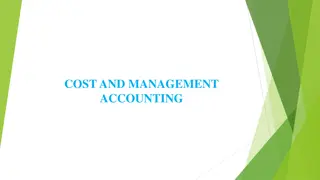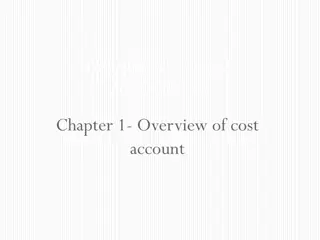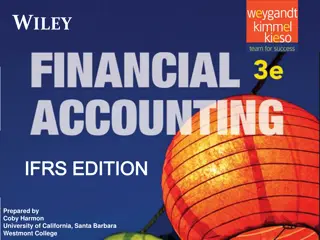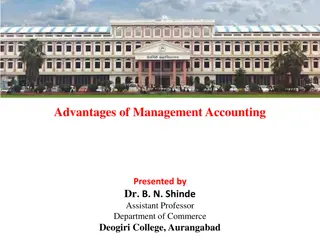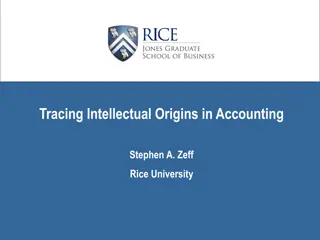Financial Accounting at Deogiri College Aurangabad
Financial Accounting is a crucial aspect of business management, involving the systematic recording and interpretation of financial transactions. This content delves into the fundamentals of bookkeeping, definitions, accountancy principles, and the importance of financial reporting for stakeholders. Dr. Dhotre A. C. from the Department of Commerce at Deogiri College, Aurangabad, presents comprehensive course contents for B.Com 1st year students, covering topics such as Introduction, Accounting Cycle, Journal, Ledger, and Balancing of Accounts.
Download Presentation

Please find below an Image/Link to download the presentation.
The content on the website is provided AS IS for your information and personal use only. It may not be sold, licensed, or shared on other websites without obtaining consent from the author.If you encounter any issues during the download, it is possible that the publisher has removed the file from their server.
You are allowed to download the files provided on this website for personal or commercial use, subject to the condition that they are used lawfully. All files are the property of their respective owners.
The content on the website is provided AS IS for your information and personal use only. It may not be sold, licensed, or shared on other websites without obtaining consent from the author.
E N D
Presentation Transcript
Topic :Financial Accounting Dr. Dhotre A. C. Department of Commerce Deogiri College, Aurangabad 1
Financial Accounting For B. Com. I year I Sem Presented By Dr. Dhotre A. C. Assistant Professor Dept. of Commerce Deogiri College, Aurangabad.
Course Contents Prepared for Chapter I Subject Financial Account (B.com I Yr for I Sem) Introduction, Meaning, Definitions, Concepts, Objectives, Need, Scope, Importance, Classification and Rules of Account, Accounting Cycle, Journal, Ledger, Balancing of Accounts
Introduction Book Keeping is a systematic manner of recording transactions related to business in the books of accounts. Book Keeping, transactions are recorded in the order of the dates. An Accountant is a person who records the transactions in the books of the business and is expected to show the financial results of a business for every Financial year. A financial year in India is followed from 1st April to 31st March. Book Keeping is an art as well as a science. It is the art of recording day to day business transactions in the books of accounts in a scientific and systematic manner.
Definitions of Book Keeping J. R. Batliboi: Book Keeping is an art of recording business dealings in a set of books. R.N Carter: Book Keeping is an art of recording in the books of accounts, all those business transactions that result in transfer of money s worth Spicer and Pegler: Book Keeping is a systematic recording of all the transactions in a manner enabling the relationship of business with other persons to be clearly disclosed and the cumulative effect of transactions on the financial position of the business itself can be correctly ascertained.
Accountancy. Accountancy Involves: Systematic Classification Of Business Transactions In Terms Of Money And Financial Character. Summarizing : Trail Balance And B/S Interpreting The Financial Transactions. Meaning of Financial Accounting: Accounting is the process of recording, classifying, summarizing, analyzing and interpreting the financial transactions of the business for the benefit of management and those parties who are interested in business such as shareholders, creditors, bankers, customers, employees, and government. Thus, it concerns with financial reporting and decision making aspects of the business.
Definition of Accountancy Definitions: An act of recording, classifying and summarizing the business transactions, balancing of accounts, drawing conclusions and interpreting the results thereof. Kohler: Accountancy refers to the entire body of the theory and process of accounting. Prof. Robert N. Anthony: Nearly every business enterprise has an accounting system. It is a means of collecting, summarizing, analyzing and reporting in monetary terms information about the business transactions.
Difference Between Accountancy And Bookkeeping Book keeping is merely recording the business transactions in books and ledgers . Accountancy is wider concept: compilation of accounts in such a way that one is in a position to understand state of affairs of business. Users of financial statements are income tax department, department shareholders, investors ,banks and so on.
Difference Between Accountancy And Bookkeeping It is in the interest of all that financial statements reflect true and fair view of state of affairs of an entity. Accounting Standards and principles An accountant designs the accounting system, supervises and checks the work of the book-keeper, prepares the reports based on the recorded data and interprets the reports. Nowadays, he is required to take part in matters of management, control and planning of economic resources.
Distinction Between Accounting And Accountancy Although in practice Accountancy and Accounting are used interchangeably yet there is a thin line of demarcation between them. The word Accountancy is used for the profession of accountants - who do the work of accounting and are knowledgeable persons. The word accounting tries to explain the nature of the work of the accountants (professionals) and the word Accountancy refers to the profession these people adopt.
Nature of Financial Accounting Accounting Is First Step Accounting is start when a financial transaction take place. It records the financial transaction after that communicates this information to its users. then the user this information for their decision making. Accounting Is An Art And Science: Accounting Is A Process Accounting Deals With Financial Transactions Only Financial accounting is considering only monetary transactions. It does not take into account various non-financial aspects such as market competition, economic conditions, government rules, and regulations, etc.
Nature of Financial Accounting Historic In Nature Financial accounting considers only those transactions which are of historic nature. day-to-day activities transactions are recorded and the information is provided after a period of time. All financial decisions of the future are taken on the basis of this past information Records Actual Cost Financial accounting records the actual cost of the transaction and does not consider the price fluctuations taking place from time to time. It records the historical cost or the actual cost of the assets or liability.
The Basic Accounting Equation Financial accounting is based upon the accounting equation. Assets = Liabilities + Owners' Equity This is a mathematical equation which must balance. If assets total $300 and liabilities total $200, then owners' equity must be $100.
Basis of Accounting Cash Basis: All the transactions of business which take place in cash are called Cash transactions. In this method, an expense is recorded only when it is actually paid in cash. Similarly, an income is booked only when it is actually received in cash. Accrual Basis: Both Cash and Credit transactions are recorded in this system of accounting. In the Accrual basis of accounting, transactions are recorded as and when they occur. Incomes are recorded when they are earned, irrespective of whether the cash has been received or not.
Objectives of Accountancy: Ascertain the Profit or Loss of a business for a particular accounting period. To establish the financial position of a business during a given accounting period Arrive at the Total Capital on any given date. Determine the positions of Assets and Liabilities on any given date. Identify and keep a check on any frauds and misappropriations of money. Spot the various errors and rectify them by passing the necessary entries.
Objectives of Accountancy: Verify the arithmetic accuracy of the books of accounts. Compute the cost of production. Facilitate the management in decision making by providing accounting ratios, reports and relevant data. Facilitate the management in preparing, analysing and controlling the cash flows of the business. Help the management form policies for controlling cost, preparation of quotation for competitive supply
Scope of Financial Accounting Records Financial Transactions Classify And Summarize Information Prepares Financial Statements Interprets Financial Information Communicates All Outcomes Determines And Maintains Financial Position
Importance of Accounting Financial Statements These are reports that summarize the financial performance These reports indicate the business economic growth Annual reports financial statements shareholders and potential investors in the form of annual reports are provided to the
Importance of Accounting Accountability People who handle the cash in the company are responsible for it. Budgeting This allows business to estimates its future sales and expenses. Taxation Records must be kept in order to pay taxes.
Thank You



